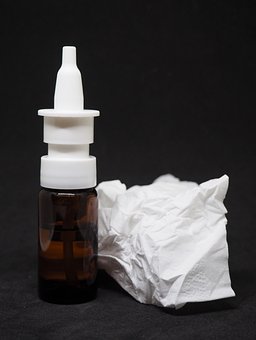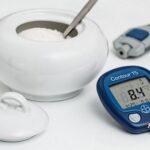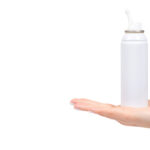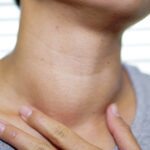What is it Nasal spray?
A stuffy nose spray relieves congestion or runny nose caused by allergies. This allergy results from attacking the body’s immune system by mistake, causing the production of antibodies and histamine, which causes allergic reactions such as sneezing, runny nose and nasal congestion. Nasal decongestant sprays can help reduce inflammation and help breathing.
How nasal sprays are absorbed into the body
The allergy medicine contained in the nasal spray is absorbed by the body, specifically the site of congestion, so that the effect of the medicine settles in the lining of the nasal passages to treat the symptoms of allergic rhinitis, by preventing sneezing, runny nose and nasal congestion, while reducing the side effects that a person may be exposed to if he uses medicines Substitute nasal sprays.
Types of nasal sprays
Nasal sprays can be categorized into six types, depending on the function of each type species:
1. Decongestant nasal sprays
Decongestant nasal sprays treat nasal congestion by narrowing the blood vessels and swollen tissues in the nasal passages in order to reduce inflammation, reduce nasal swelling, and reduce mucus production that causes a runny nose. They are useful in treating colds, flu, or allergies. It is advised not to use it for more than three days to avoid addiction to its use.
2. Corticosteroid nasal sprays
Steroid nasal sprays or corticosteroid nasal sprays are anti-inflammatory medications. So that it works to reduce inflammation in the nasal passages, and also reduces nasal congestion, sneezing, teary eyes, and runny nose. It is used to treat allergies, hay fever, and sinusitis, and can be used for the recommended duration to obtain the desired treatment.
3. Antihistamine nasal sprays
Antihistamine nasal sprays block the release of histamine and reduce the allergic reactions it causes such as runny nose, itching and congestion caused by the allergic immune response.
4. Saline nasal sprays
Saline nasal sprays moisturize the nasal passages to prevent nosebleeds caused by dryness, and they usually contain a saline solution consisting of salt and sterile water. It also helps breathing in case of colds or allergies.
5. Cromolyn sodium nasal sprays
The use of cromolyn sodium sprays helps to inhibit the function of mast cells that secrete histamine, which causes allergy symptoms such as sneezing, nasal congestion, and runny nose. These sprays help treat nasal obstruction when used when exposed to seasonal allergens. It is advised to consult a doctor before using them, especially when suffering from asthma or pain paranasal sinuses.
6. Anticholinergic nasal sprays
Anticholinergic nasal sprays relieve runny nose in patients with allergic and non-allergic rhinitis, by blocking the function of the neurotransmitter acetylcholine to reduce secretions in the nasal passages.
Benefits of a nasal spray
The benefits of nasal sprays vary according to the different types and diseases to be treated, and these benefits include:
-
Treating nasal congestion and allergies
Nebulizers are used to treat Symptoms of allergic rhinitis Such as inflammation, congestion, gonorrhea, or sneezing, as they are concentrated in the nasal passages, which helps reduce swelling and relieve nasal obstruction. Steroid nasal sprays and antihistamine sprays are among the types designated for treating allergy symptoms.
-
Treating headaches and migraines
Nebulizers can help Headaches and migrainesAnd it can make the process of recovery from pain and inflammation quick as a result of the passage of the drug through the blood vessels in the nasal cavity and its rapid transfer to the bloodstream, and it is used when the inability to tolerate oral medications as a result of nausea and vomiting.
-
Treatment of rhinitis and sinusitis
Corticosteroid nasal sprays help Sinus infections and rhinitis, by reducing nasal congestion and swelling of the nasal passages and opening up the sinuses to help drain mucus.
Also read: Sinusitis: causes and treatment methods
-
Other uses for nasal sprays
Nebulizers can also be used to treat hay fever or allergic rhinitis. Nasal steroids are important medications to help treat allergic rhinitis, with the goal of reducing nasal symptoms such as congestion, runny nose, congestion and sneezing.
Decongestant nasal sprays can also be used to treat congestion caused by a cold or flu.
How to use the nasal spray
To make nasal sprays more effective, it is advised to follow the advice and instructions provided in each package to avoid excessive or incorrect use.
Before using the nasal spray
It is recommended that before using the nasal spray:
- Gently blow your nose to clear the nasal passages.
- Wash hands with soap and water and dry them with a clean towel or clean them with sanitizer.
- Follow any additional information regarding the nebulizer containers used.
The correct way to use a nasal spray
To use the nasal spray correctly, it is advised to read the product instructions to ensure the correct way to use it. The following instructions are usually recommended:
- Ensure that the bottle is held and whether the sprayer is inhaled or not.
- Spray a small amount of the spray in the air to prepare it for use.
- Pump the spray into one nostril, making sure to direct it to the back of the nose so that the medicine reaches the sinuses.
- Keep the sprayer away from the middle of the nose or the septum, which is the cartilage or bone that separates the nasal cavity, in order to avoid tissue damage and bleeding.
After using the nasal spray
After using the nasal spray, it is advised not to inhale or swallow the medicine through the throat, as this leads to the ineffectiveness of the medicine in treating rhinitis and sinusitis. Instead, the air can be inhaled lightly and gently to avoid the medicine reaching the throat.
Common side effects of nasal sprays
Although the use of this type of medication is considered safe, it may be associated with some side effects and health risks, including:
1. Medicinal rhinitis
Medicated rhinitis results from excessive use of decongestant nasal sprays, as they contain chemicals that constrict congested blood vessels and relieve airway obstruction. However, excessive use can lead to a poor response of blood vessels to the drug, therefore, the number of times and days recommended in each type of nebulizer should be respected.
2. Nasal congestion
Excessive use of nasal sprays can lead to nasal congestion. Therefore, the use of decongestant sprays can worsen when the recommended doses are not respected.
3. Nosebleeds
Improper use of nasal sprays can lead to nosebleeds. Therefore, in the event of nosebleeds, a specialist examination is recommended to ensure that the nasal tissues and nasal septum are healthy.
Also read: Nosebleeds (epistaxis): When is it dangerous?
4. Withdrawal symptoms
The use of the inhaler can have side effects associated with withdrawal symptoms, which are the symptoms that a person feels after stopping the use of the inhaler, which usually include headaches, sleep disturbances, and anxiety.
5. Damage at eye level
People who are at high risk of developing ocular health damage such as glaucoma and cataracts can trigger these risks with nebulizers. Therefore, it is advised to consult a doctor before using any of them.
Also read: Glaucoma or high eye pressure: its symptoms, causes, and treatment methods
Are nasal sprays harmful?
Nasal sprays are considered safe to use, and the risk of side effects associated with them is low except in the case of excessive use, which may cause dryness and tingling in the nose, then sinus pain and sore throat.
Does nasal spray affect the heart?
Decongestant sprays shrink the blood vessels in the nose to relieve blocked airways. However, the role of nebulizers is not limited to reducing the size of blood vessels in the nose, but it can also shrink the size of vessels in the body, which can lead to high blood pressure that may affect heart health.
Risks Associated with Abuse and Overuse
Nasal sprays can be overused when used for more than a week, or when used more frequently and more than the recommended dose, which increases the risk of severe nasal congestion when they stop using them suddenly, in addition to nasal dryness, burning, tingling, and nosebleeds.
If you overuse it, you can experience symptoms that include sneezing, runny nose, difficulty breathing, sore throat, and sinus pressure.
Precautions for long-term use
To avoid the risks of using nasal sprays, it is recommended to use other decongestant medications such as antihistamines and oral decongestants, or use nasal saline solution to relieve obstruction of the airways. It is also advised not to use the nebulizer more than once every 15 hours or more than 3 days.
Are nasal sprays addictive?
Nasal sprays are not addictive, but misusing them can cause nasal congestion, nosebleeds, headaches, and reduce the effectiveness of the medication, which leads a person to use them frequently due to their need for immediate relief from that congestion.
Frequently asked questions that may interest you
When does the nasal spray start to work?
according American Academy of Family Physicians, It can take up to two weeks to treat allergy symptoms or nasal congestion after using a nasal spray before you notice a positive effect.
How many times a day do I use the nasal spray?
To be sure of the recommended number of times to use the nasal spray, it is recommended to review the information and instructions contained in each package separately, as the number of doses per day and then the recommended days not to use the spray differ according to each type of spray, in order to avoid side effects that may be experienced. As a result of excessive use of the spray, such as tissue damage in the nose, or swelling and obstruction of the airways.
When should you not use a nasal spray?
If you have diabetes, high blood pressure or an overactive thyroid gland, and if you are taking other medications at the same time as using the nasal spray, consult a medical professional before using the nasal spray. It is also not recommended if you suffer from damage to your nasal passages from excessive use of the nasal spray.











